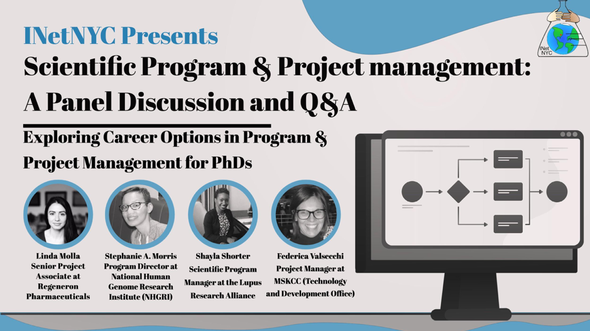|
Words by Dr. Marta Collu Edited by Dr. Laurie Herviou, Dr. Conchi Izquierdo and Dr. Lucie Yammine As scientists, we apply project management principles every day, from planning and leading research activities, to effectively engaging and communicating with people. Yet, Project Management is a discipline on its own, and many scientists have chosen to transition from a bench research position to a management role. You are probably a scientist at the stage of exploring alternative career paths, looking for networking opportunities and to know more about what being a scientific project manager actually is. To help you with it, INet-NYC hosted a virtual career development event on February 23rd, 2021, dedicated to Scientific Program and Project Management. Flyer of the event by Matthew Baffuto The event, featuring four experts in the field, aimed to discuss how to sail to a project management career in a relaxed, conversational atmosphere. INet-NYC board members, Dr. Marta Collu, Dr. Rinki Saha and Dr. Zafar Mahmood were the organizers and moderators of this event. To start, the panelists were invited to give a brief introduction about themselves, describing their background and current role. All trained as scientists and earned a Life Science PhD degree, they transitioned to a project management role, and currently work for institutions spanning academia, private companies, governmental and non-profit organizations. Dr. Linda Molla works as Senior Project Associate at Regeneron Pharmaceuticals; Dr. Stephanie Morris is Program Director at the National Institutes of Health (NIH) in the National Human Genome Research Institute’s (NHGRI) Extramural Research Program; Dr. Shayla Shorter manages the scientific review of the Lupus Research Alliance research grants; and Dr. Federica Valsecchi is the Immunotherapy Project Manager of the Technology and Development Office (TDO) at Memorial Sloan Kettering Cancer Center (MSKCC). The diversity of the organizations our speakers work for immediately gave us a grasp of how versatile the scientific program and project management fields can be. Next, we discussed what are the most critical skills a scientific project manager should possess. “A big part of this role has to do with knowing the science, building relationships with the people, ‘connecting the dots’ and providing your support and your knowledge to the different scientific teams”.-Dr. Linda Molla As project managers constantly interact with scientists and experts, the scientific mindset surely gives the advantage of understanding the rationale behind the different project phases, and of being able to see the bigger picture. But a project management role also involves much more than science skills. For instance, communication and interpersonal skills are key: project managers engage and communicate on a daily basis with a very diverse audience, from the chief of a company, to the members of a team, or the families of a patient. Therefore, they learn how to distil very complex concepts to a level that is understandable to the targeted audience, as well as how to build strong relationships and trust among people. Dr. Federica Valsecchi added that versatility, organization, and ability to learn are also part of the core skills of a successful project manager. If all the highlighted skills do not sound familiar to you, think about your research. “You take all the skills you acquired throughout your PhD and/or postdoc experience and you just use them in really versatile ways. You all have acquired so many skills in terms of communication, multitasking and troubleshooting, and those can be applied in so many ways”. -Dr. Shayla Sorter Through defining specific aims, creating a research plan, troubleshooting, coordinating with collaborators, and presenting your work you learned how to manage projects! All the panelists highlighted that throughout our graduate school and/or postdoc experiences, we have acquired many more abilities than we think, and it is just a matter of understanding how to translate and put them in practice in a management role. Depending on what your interests are, the growth possibilities and career advancements in the field are blooming. As a great example, Dr. Stephanie Morris is now program director of an NIH division. She also explained that colleagues seeking an alternative path outside NIH, often transition to a research director role at academic institutions. Dr. Federica Valsecchi added that as a project manager of the TDO you often engage with outside entrepreneurs, investors, and industry partners, and you may become interested in transitioning into business development. Many more interesting points were touched upon during the event, and you can watch the full discussion here. By sharing their experience and advice, our panelists showed us how this job represents a fulfilling career choice for STEM PhDs who are interested in pursuing a non academic career and still love to be engaged with science. During a conversation with Dr. Linda Molla a few months ago I was captivated by her depiction of the role of a project manager: the one on the backstage rather than on the frontline, leading people, giving support and making things happen. If this is what drives you, start exploring this path! Do you want to watch the full event?
0 Comments
Your comment will be posted after it is approved.
Leave a Reply. |
Archives
November 2024
Categories
All
|

 RSS Feed
RSS Feed